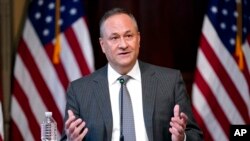Second gentleman Doug Emhoff urged the international community Thursday to speak out against antisemitism and called out those who do not, saying silence is not an option.
“This moment requires bold collective action and urgency, not just concepts,” Emhoff, the husband of U.S. Vice President Kamala Harris, told a gathering at the United Nations.
“We must build coalitions to tackle this epidemic of hate,” he said. “We must bring together people from all backgrounds, faiths and ethnicities, because hate is interconnected. It affects everyone.”
Emhoff, who is the first Jewish spouse of a U.S. president or vice president, has been leading White House efforts to fight growing anti-Jewish sentiment. He recently visited Krakow, Poland, and the German capital, Berlin, and hosted a roundtable on antisemitism at the White House in early December.
He told the gathering of diplomats and activists that all people must be able to live and worship freely without fear or violence.
Argentina, Britain, Canada, Israel and Morocco co-hosted the event with the United States. Morocco signed the Abraham Accords in December 2020, normalizing its relations with Israel.
'It's about all of us'
Emhoff, a lawyer and professor, emphasized that antisemitism is not just about Jews.
“It’s about all of us,” he said. “Antisemitism is often accompanied by other forms of hatred and intolerance.”
He said it is important to push back on Holocaust denial, distortion and disinformation, noting that anti-Jewish sentiment has been around for centuries.
“It changes. It’s like a virus — it adapts, but it remains,” added Deborah Lipstadt, U.S. special envoy for monitoring and combating antisemitism, who was part of a panel discussion.
Antisemitism has been on the rise in the United States. The Anti-Defamation League said 2021 was the highest year on record for documented reports of harassment, vandalism and violence directed against Jewish communities.
In December, President Joe Biden announced the United States plans to launch a national strategy to counter antisemitism, which will focus on education.
“We see this as an immediate security imperative and also as a long-term investment in promoting love, compassion, tolerance and the primacy of human rights,” U.S. Ambassador to the U.N. Linda Thomas-Greenfield said.
Words matter
U.N. Secretary-General Antonio Guterres has also been outspoken on the issue of rising antisemitic, racist and xenophobic language, particularly on social media platforms. He has called for guardrails for parts of the internet, which he said recently have become a “toxic waste dump for hate and vicious lies.”
Guterres has also launched a U.N. strategy and plan of action on hate speech.
“The painful truth is, even today, antisemitism is everywhere. If anything, it is increasing in intensity,” he told an audience at a New York City synagogue last month during a Holocaust remembrance event. “And the same is true for other forms of racism and hate: Anti-Muslim bigotry. Xenophobia. Homophobia. Misogyny.”




